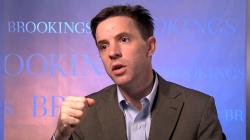

11:00 am EDT - 12:30 pm EDT
Past Event
11:00 am - 12:30 pm EDT
1775 Massachusetts Avenue, NW
Washington, DC
20036
Europe is often derided as an economic giant but political dwarf, divided and unable to defend its interests and values in the world. But a closer examination of European foreign policy leads to a more nuanced, less negative conclusion. On a number of issues, Europeans have common objectives and achieve operational levels of coordination—whether through European Union (EU) institutions or outside of them. Most significantly, they obtain results.
To offer a more accurate perspective on European foreign policy performance, Brookings Senior Fellow Justin Vaïsse, Hans Kundnani and a team of researchers from the European Council on Foreign Relations have created the European Foreign Policy Scorecard. This annual report assesses the performance of the 27 member states and the EU institutions on six major policy areas: relations with China, Russia, the United States, and “Wider Europe,” crisis management and multilateral issues.
On April 28, the Center on the United States and Europe (CUSE) at Brookings and the Heinrich Boell Foundation hosted a discussion of this inaugural assessment of the EU’s foreign policy performance. Panelists included Marta Dassù of the Aspen Institute Italia; Steven Erlanger of The New York Times; Charles Grant of the Center for European Reform; and Mark Leonard of the European Council on Foreign Relations. Senior Fellow Justin Vaïsse provided introductory remarks and moderate the discussion. After the program, panelists took audience questions.


John Villasenor
September 24, 2024

Sam Boocker, Alexander Conner, David Wessel
September 23, 2024

George Ingram
September 20, 2024